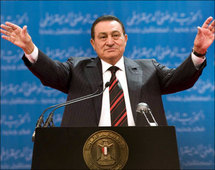Egypt's Mubarak 'could be in power for life'
Hala Boncompagni
CAIRO, Hala Boncompagni - Egypt's 82-year-old President Hosni Mubarak is likely to seek re-election next year and serve for the rest of his life, British daily The Guardian reported citing WikiLeaks.
The disclosure came in a secret US diplomatic cable from Washington's ambassador to Cairo, Margaret Scobey, which was released by the whistleblower website WikiLeaks, the newspaper reported late on Thursday.

"Scobey's candid view... is that Mubarak... is most likely to die in office rather than step down voluntarily or be replaced in a plausible democratic vote," The Guardian reported.
The cable says: "The next presidential elections are scheduled for 2011, and if Mubarak is still alive it is likely he will run again, and, inevitably, win."
"Despite incessant whispered discussions, no one in Egypt has any certainty about who will eventually succeed Mubarak nor under what circumstances."
Mubarak's 47-year-old son Gamal -- a banker who has risen through the ranks of his father's party -- was named a "likely contender" along with intelligence boss Omar Suleiman and Arab League chief, Amr Mussa, a former foreign minister.
"Mubarak's ideal of a strong but fair leader would seem to discount Gamal Mubarak to some degree, given Gamal's lack of military experience, and may explain Mubarak's hands off approach to the succession question," it said.
"Indeed, he seems to be trusting to God and the ubiquitous military and civilian security services to ensure an orderly transition."
Mubarak, who underwent surgery in March to remove his gall bladder and a small growth on the intestine, is yet to say whether he will contest the election.
At the time the cable was written, he was described as being "in reasonably good health: his most notable problem is a hearing deficit in his left ear."
The cable's release follows the November 28 and December 5 parliamentary elections in which Mubarak's ruling National Democratic Party clinched 420 of 508 seats, bolstering its grip ahead of the presidential vote.
Independents won 70 seats while the opposition garnered only 14 after most of them boycotted the polls, which monitors said were marked by widespread fraud and the United States expressed concern about.
Cairo has dismissed the fraud charges and called criticism of the election from its US ally as amounting to "unacceptable interference" in domestic affairs.
The cable describes Mubarak as "a tried and true realist, innately cautious and conservative, and has little time for idealistic goals."
"Mubarak has no single confidante or adviser who can truly speak for him, and he has prevented any of his main advisers from operating outside their strictly circumscribed spheres of power," it said.
"Gamal Mubarak and a handful of economic ministers have input on economic and trade matters, but Mubarak will likely resist further economic reform if he views it as potentially harmful to public order and stability."
It also said Mubarak was "a classic Egyptian secularist who hates religious extremism and interference in politics" for whom the opposition Muslim Brotherhood "represent the worst."
The Brotherhood won a fifth of parliament's seats at the last election in 2005, but failed to garner any in the latest polls.
The cables also highlights Egypt's role in regional conflicts, including the Middle East peace process and Iraq. It also summarises Mubarak's view of former US president George W. Bush.
"Mubarak viewed President Bush as naive, controlled by subordinates and totally unprepared for dealing with post-Saddam Iraq, especially the rise of Iran's regional influence," it said.
-------------------------------------------------------------------------------